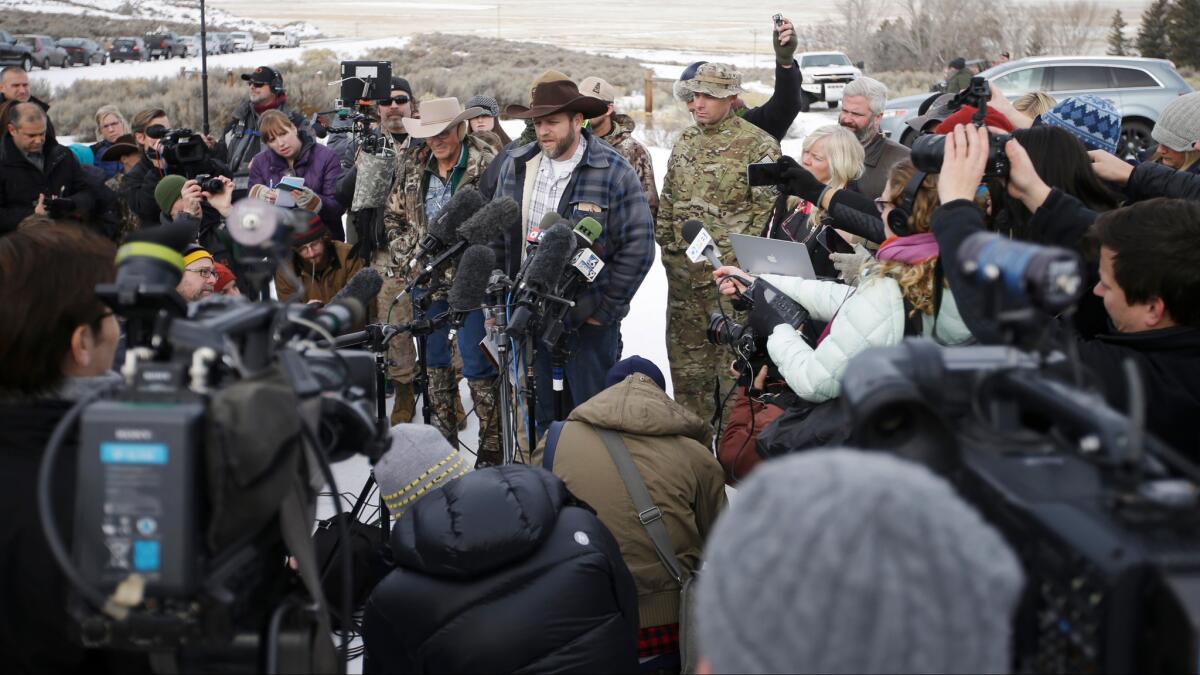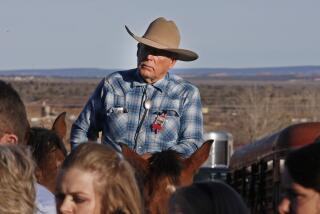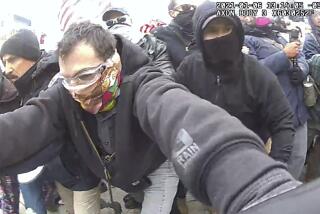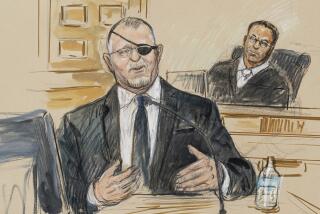Trial begins for protesters who occupied Malheur National Wildlife Refuge in Oregon standoff

Reporting from PORTLAND, Ore. — The protesters who occupied an Oregon wildlife refuge this year documented the siege in detail because “they wanted the world to know” they had taken over the 187,000-acre sanctuary in the belief they could become its owners, a federal prosecutor said Wednesday.
They held daily news conferences, sent Internet communications and posted videos on YouTube, Assistant U.S. Atty. Geoffrey Barrow said.
Much of that material is now being used as evidence against the protesters in court, and the government expects it “will show the defendants — by their words, by their actions and by their conduct — are guilty” of conspiracy, Barrow said in his opening statement.
There was little doubt they were there, Barrow said. They took pictures of themselves working at the desks of federal employees, going through U.S. records.
The standoff left one protester dead and caused millions of dollars in damage, including the creation of bunkers and trenches. Authorities also found dozens of guns and 15,000 rounds of ammunition in the refuge’s various work areas.
The seven on trial here, including leaders Ammon and Ryan Bundy, sons of Nevada militant leader Cliven Bundy, were among 26 occupiers arrested after ending their 41-day siege of the Malheur National Wildlife Refuge in southeast Oregon. They are charged with conspiracy to impede the work of government employees.
Ammon Bundy’s attorney, Marcus Mumford, said in his opening statement that “conspiracy… suggest acts of darkness.” But the occupiers acted openly and in the belief what they did was lawful, he argued. They asserted what they felt was their right to recover land wrongfully taken by the U.S.
Bundy grew up watching his father battle the Bureau of Land Management over cattle grazing rights, Mumford said. The son came to believe in the words of Ronald Reagan, he said, who once proclaimed, “The nine most terrifying words in the English language are: I’m from the government and I’m here to help.”
The government has a tape of Bundy at a rally before the takeover saying he was going to take a “hard stand” against the U.S. He then led the refuge occupation later that day, Jan. 2. “They make it sound like he’s preparing for something extreme,” Mumford said. But is it extreme to ask the government to obey the law? he asked.
Ryan Bundy, acting as his own attorney, said in his opening statement that he’s “in favor of government as long as it’s done correctly.” He also submitted a copy of the “Pocket Constitution” as Exhibit 1 but was denied a request to hand a copy to each juror.
Attorney Matthew Schindler, who is assisting Ken Medenbach, the only Oregon defendant, said his client’s participation was in part an attempt to prevent the demise of rural life in America.
“These people have no voice in Washington anymore,” he said. As for the takeover, Schindler added, “it worked.” Reporters from around the world showed up and finally gave the occupiers a voice.
Opening statements were expected to spill over to Wednesday in what is predicted to be a lengthy trial, presided over by U.S. District Judge Anna Brown, nominated to the bench by President Clinton 17 years ago.
Cliven Bundy, 70, declared victory after his 2014 Nevada standoff ended when federal officers backed down. But after the Oregon takeover ended in February, the government belatedly went after him and others. He was arrested at the Portland airport en route to support his sons at the refuge and charged in the Nevada standoff, along with two other sons, David, 39, and Melvin, 42. He is in custody in Las Vegas awaiting trial next year. Ammon, 41, and Ryan, 44, also will stand trial in Las Vegas.
The unfolding Oregon case marks the first of two mass trials — the second is set for next year — stemming from the Malheur standoff, and Brown has tried to keep the process from bogging down in arcane legal arguments over “adverse possession” or complicated interpretations of the Founding Fathers’ intentions.
Though some defendants also face gun and theft charges, federal prosecutors, to prove conspiracy, will need to show only that the defendants interfered with the work of federal employees. Law enforcement officers and others who witnessed the siege are prepared to tell the court that refuge workers were run off by the defendants, prosecutors say. If convicted, the maximum sentence for interfering with a federal employee is six years.
Brown also is expected to have her hands full with more than a dozen attorneys representing or assisting the seven defendants. (Charges against an eighth defendant were dropped last week.) A courtroom in the Mark O. Hatfield Federal Courthouse — named for the late U.S. senator once considered a vice presidential running mate to Richard Nixon — has been remodeled, with defendants and attorneys given workstations with computers and microphones. They’ll face a jury of eight women and four men and eight alternates. About 25 seats are set aside for the media and public on a first-come, first-served basis. Two other courtrooms with live audio and video feeds will host the expected crowd overflow.
The judge also must deal with three defendants who are representing themselves, with some assistance from appointed counsel. Ryan Bundy, for example, already has strained the judge’s patience by reportedly planning a jail escape and filing questionable motions, including one declaring himself an idiot. In one of her first legal moves, protester Shawna Cox, who was in the vehicle driven by occupier Robert “LaVoy” Finicum just before his shooting death by Oregon State Police, sued the government for damages “in excess of $666,666,666,666.66.”
Brown has told Cox not to take “screwball positions.” But the judge didn’t seem too hopeful about that and other courtroom slowdowns. Despite her attempts at tight control, she expects the trial to run for more than two months and has cleared her calendar through Thanksgiving.
Anderson is a special correspondent.
UPDATES:
6:20 p.m.: This article was updated with more reporting from opening statements.
2:10 p.m.: Updated with details of the opening statements.
This article was originally published at 9:00 a.m.
More to Read
Sign up for Essential California
The most important California stories and recommendations in your inbox every morning.
You may occasionally receive promotional content from the Los Angeles Times.










